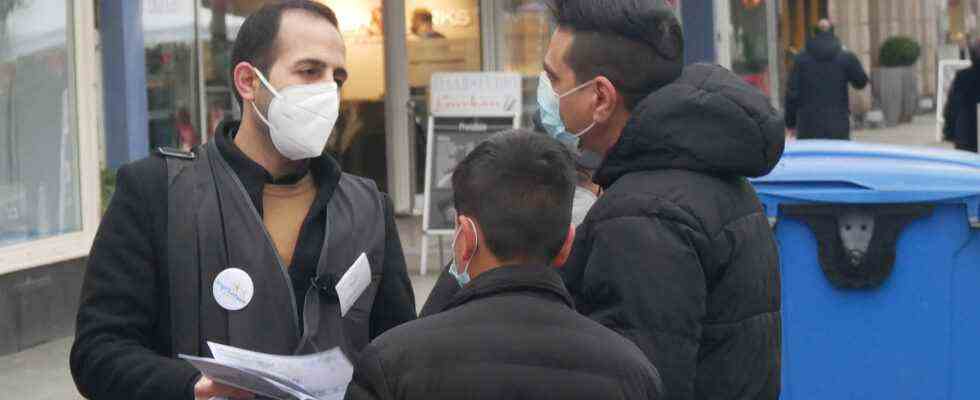Status: 07.02.2022 11:11 a.m
Overcome skepticism, worries and language barriers directly on site with mobile teams: Many cities send multilingual “vaccination pilots” on tour. What are your experiences, for example in Mainz?
An ice-cold wind blows through the pedestrian zone in Neuwied, Rhineland-Palatinate. Walid Alsem and Suzan Shahbandar are still on the road. They take to the streets for vaccinations. The two people with a migration background specifically address them.
“Hello, may I talk to you?” Alsem asks a young man who initially wants to continue and says he can hardly speak German. Alsem hears the accent in the voice and immediately switches – to Persian. Suddenly the conversation gets going.
Walid Alsem and Suzan Shahbandar are vaccination coordinators. They provide information about the vaccination against the corona virus, provide information and answer questions. Both are natives of Syria. Before their publicity tour in Neuwied they did a training at the Christian peace service “Eirene”. Both have information material in 24 languages with them on their tour. “My mother tongue is Arabic. But I can also speak Persian and, of course, German. That helps a lot for our goal. The language can be a bridge,” says Alsem, who, like his colleague, wears a jacket and a bag with the inscription “Vaccination Pilots”.
Her job is not always easy, there are often lengthy discussions: Impflotse Alsem in Neuwied
Image: SWR
Your job is tedious. Some passers-by react irritably and simply leave both standing. But most of them show interest after an initial hesitation. There are often lengthy discussions. “We have an important concern and we won’t be discouraged. We don’t know if people really get vaccinated, but I think we can reach many,” says Alsem.
A bit like doorstep campaigning
In Mainz, Behrouz Asadi coordinates the vaccination officers. He is head of the Malteser Migration Office for Rhineland-Palatinate and Hesse. “We spoke to the State Center for Health Promotion for the first time in the summer,” reports Asadi. The project is now part of a five-point program by the state government to increase the vaccination rate. It’s a bit like doorstep election campaigns by parties, says Asadi. “We want to get close to people – on the street, in front of the supermarket, in day care centers or at sports clubs.” Even before vaccination buses come to a district, the vaccination controllers are on the road there.
Seven of them are currently in action in Mainz. As in Neuwied, they would accompany people to the vaccination center to translate there, says Asadi. The offer is aimed at all citizens. According to Asadi, some of his employees and many volunteers are immigrants and therefore multilingual. “We want to use that in a targeted manner. Some of the immigrants also have worries, fears and insecurities. It’s much easier to inform people in their mother tongue.”
As in Neuwied, some of those addressed reacted aggressively in Mainz. There is usually a lot of uncertainty, explains Asadi. It is precisely then that face-to-face discussions are particularly important. The vaccination controllers would also be trained for such situations beforehand. In addition, stories of conspiracies have been circulating among some migrants, as well as in other parts of society. “We can unmask that with facts. A hard core will remain against vaccination, but in the end we can persuade many to spade,” says Asadi.
Successful strategy in Bremen
The project from Rhineland-Palatinate is reminiscent of the strategy in Bremen. The Hanseatic city was one of the nationwide leaders in terms of vaccination rates early on, also due to a large number of low-threshold vaccination offers. Last year, the authorities found that there were many infections where poverty is high and the proportion of immigrants is high. According to the Senate, there is a lack of trust in the state in these quarters. Language barriers and lack of information also played a major role. A new study by the Robert Koch Institute also confirms these connections.
That is why the Bremen Senate relied on mobile teams early on, which were present in structurally weak districts. In addition, Bremen promoted close cooperation between authorities, aid organizations and those responsible on site – such as with district management, local offices, clubs, religious communities and district initiatives.
Rhineland-Palatinate wants to expand the offer
In the State Center for Health Promotion in Mainz, Susanne Herbel-Hilgert leafs through the documents for the vaccination guides in Rhineland-Palatinate. 37 of them are currently deployed in five municipalities in the federal state. “We don’t have exact figures on how many people have decided to get vaccinated as a result of the project. But we’ve had positive feedback from the vaccination officers,” she reports.
Low-threshold offers are also needed in other languages. “That’s why we want to make such an offer to all districts and urban districts in Rhineland-Palatinate,” announces Herbel-Hilgert. But that still takes time, because you first have to find employees and volunteers in job centers, for example. “Vaccination pilots are to go on tour in Ludwigshafen soon. We have to keep at it. Corona and the vaccination will be with us for a long time to come.”

